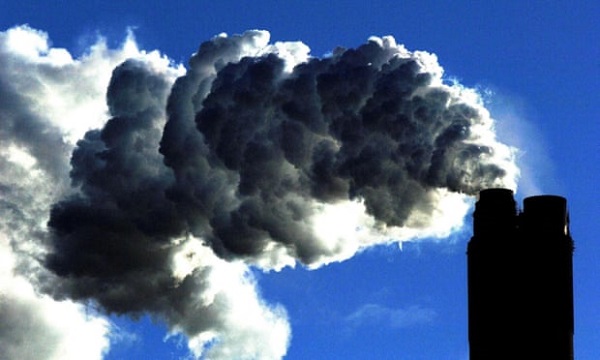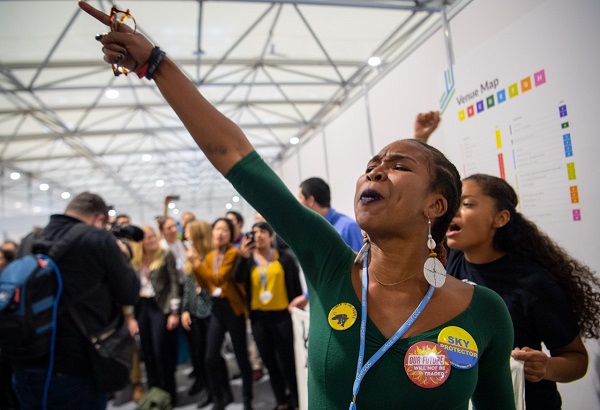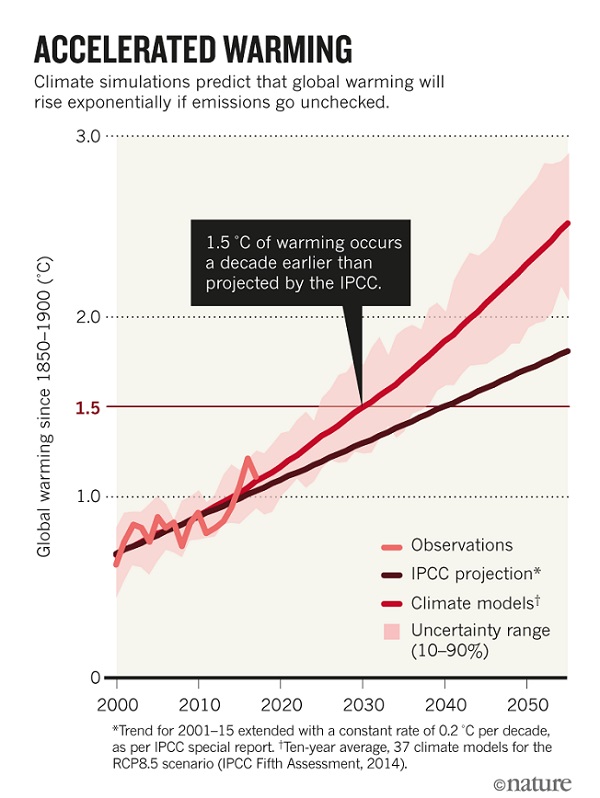
It was a strange decision to hold the UNFCCC’s Conference of Parties (COP24) in Katowice, Poland, deep in Poland’s coal mining territory. The main purpose of the conference is to finalize the implementation guidelines of the Paris Agreement.
The conference also received the special report on achieving a 1.5°C global average temperature rise prepared on request by the IPCC. While I had some reservations about the whole exercise, the report a strong wake up call on the need for more urgent cuts. Fossil fuels had to be wound back rapidly. This from Dr. Joeri Rogelj, of the International Institute for Applied Systems Analysis in Austria:
- “For coal the picture is the clearest. It is reduced 75 to 95 percent from 2010 levels across the entire economy and fully phased out from producing electricity.”
He said by 2050, renewables would need to generate between 70 and 85 percent of global electricity to meet a 1.5°C target.
“Oil use is reduced consistently across most of 1.5°C scenarios, about a 30 to 80 percent reduction from 2010 levels in 2050. Depending on how gas is used and how successful carbon capture and storage (CCS) is, natural gas use is reduced by more than 50 percent or stays roughly similar to 2010 levels.”
As David Spratt points out, there was a move to “welcome” the report:
- led by the Maldives, leader of the alliance of small island states, and backed by the EU, the bloc of 47 least developed countries, the Independent Association of Latin America and the Caribbean, African, American and European nations, and Pacific countries such as the Marshall Islands and Tuvalu.
However, four countries – Saudi Arabia, the US, Kuwait and Russia – objected to the word “welcome” and insisted it be replaced with “note”. Indeed:
Objections from Saudi Arabia, the US, Kuwait and Russia to wording to “welcome” the 1.5°C report was enough to sideline it, with Saudi Arabia threatening to disrupt the last stretch of negotiations between ministers this week if the word “welcome” was not replaced by “note”.
Then a side event put on by the US to promote its use of coal was received with anger and disrupted by protesters. That link was to Think Progress, republished at RenewEconomy, reported also at The Guardian.

Through all this Australia remained stumm. Indeed:
- Australia did not speak during the at-times heated debate, a silence noted by many countries on the floor of the conference, Dr Bill Hare, the managing director of Climate Analytics and a lead author on previous IPCC reports, told Guardian Australia.
“Australia’s silence in the face of this attack yesterday shocked many countries and is widely seen as de facto support for the US, Saudi Arabia, Russia and Kuwait’s refusal to welcome the IPCC report,” Hare said.
For information, Bill Hare is an Australian who worked for many years at the Potsdam Institute for Climate Change.
Spratt cites an article in Nature by Yangyang Xu, Veerabhadran Ramanathan and David G. Victor, Global warming will happen faster than we think. They say that the 1.5°C global warming threshold will occur around a decade earlier than projected by the IPCC, around 2030, with Earth hitting 2°C by mid-2040s:

Three lines of evidence support their conclusions.
First, greenhouse-gas emissions are still rising. In the next 25 years the globe is poised to warm at a rate of 0.25 to 0.32°C per decade – faster than the 0.2°C per decade experienced since the 2000s, and which the IPCC used in its special report.
Second, governments are cleaning up air pollution faster than the IPCC and most climate modellers have assumed. The shield of aerosols has kept the planet cooler, possibly by as much as 0.7°C globally.
Third, a slow climate cycle known as the Interdecadal Pacific Oscillation appears to be entering a natural warm phase for the couple of decades. This means more heat will stay in the atmosphere rather than going into the deep oceans, as it has in the past.
Finally, these three forces reinforce each other.
As against the above, in scouting around for this post I came upon a new study which shows that ice is melting in East Antarctica faster than thought. This should produce a layer of cool surface water which could knock as much as 0.4°C off global temperature rise, the researchers say, potentially delaying exceeding the 1.5°C and 2°C Paris temperature limits by around a decade.
Back to where we started from, possibly, which is small comfort. Moreover:
- the study adds that the meltwater could have wider impacts on the Earth’s climate, increasing the formation of Antarctic sea ice, reducing rainfall in the southern hemisphere and increasing rainfall in the northern hemisphere. It could also cause warming of the ocean beneath the surface layer around the Antarctic coast, the researchers add, leading to further ice-sheet melt and additional sea level rise.
However, the scientists responsible say:
-
some caution is warranted given that the study relies on a single climate model. It also uses a speculative ice-melt scenario and focuses on a region – the Southern Ocean and Antarctica – which climate models can struggle to simulate accurately.
I struggle to take the COP process seriously, because it does not in any way face up to the dimensions and urgency of the problems we face. Copenhagen in 2009 was meant to give us a way forward post-Kyoto. That didn’t get done until Paris 2015, then the 200 or so COP partners gave themselves another five years to work out the rules they would operate under. Their underlying principle is “common but differentiated responsibility” with countries able to decide themselves how much effort they put in.
In decisionmaking the UNFCCC operates under UN rules which means that all must agree. One dissenting country can prevent a deal.
Overall, however, with rousing speeches by Sir David Attenborough (transcript here), by UN Secretary-General António Guterres, by UN Climate Chief, Patricia Espinosa and others, the tone of the discourse has become more serious, and actors outside the COP bubble are responding more and more to the reality of the situation.
It was pleasing to see, therefore, the largest ever group of global investors call for more action to meet Paris targets:
-
The largest ever group of institutional investors has called on governments around the world to urgently increase their efforts to meet the Paris climate change agreement goals.
The 414 global investors – which represent US$31 trillion of assets-under-management – say they are deeply concerned about the “ambition gap” that exists between governments’ commitments and what is needed to limit the global temperature increase to well below 2C above pre-industrial levels.
They say that gap is increasing the physical risks from climate change and hampering investors’ ability to properly allocate trillions of dollars needed to support the much-needed transition to a low carbon economy.
They have signed a “Global Investor Statement” to be handed to world leaders this week at the COP24 – the 24th Conference of the Parties to the United Nations Framework Convention on Climate Change in Poland.
The signatories include some of the world’s largest pension funds, asset managers and insurance companies, including Australian investors BT Financial Group, Australian Super, Cbus, HESTA, IFM Investors, Local Government Super, and VicSuper.
Investors responsible for our super need to think 40 years ahead, rather than the next election, and command huge sums of money. Their basic concern, however, is that the economies of the world have a future. Their overt intervention is most welcome. Coalshevics, denialists and climate contrarians are operating in an increasingly narrowing space.

Brian, you state (bold text my emphasis):
Is there any wonder that the COP process doesn’t get very far? It takes only one recalcitrant country to stuff things up.
Meanwhile last night on ABC’s The Business there was this segment headlined The call from the country’s biggest businesses to put a price on carbon.
And posted on Wednesday (Dec 12) is an interview by Elysse Morgan with Minister Angus Taylor in an attempt to explain why the Feds need a big stick with the energy gentailers, when the Fed Gov owned Red Energy has been leading the consumer price gouging.
Posted late Wednesday at the AFR is an article by Matthew Stevens headlined Another regulator smashes Angus Taylor’s energy rhetoric, beginning with:
An interesting perspective. Check it out.
Geoff M, thanks for the Matthew Stevens reference Another regulator smashes Angus Taylor’s energy rhetoric, which I’d missed. Much of his article refers to a report Wholesale electricity market performance report December 2018 by the Australian Energy Regulator. It’s an important report, which appears to fail to find the socalled gouging which exercises ScoMo and Angus Taylor.
Just a word about Stevens. I think he reports what he sees, but in an article a couple of months ago he admitted that he likes coal. I’d suggest he’s wrong about Angus Taylor, who he would like to see let off his leash. I also have reservations about Danny Price.
Anyway, I’ll try to give the AER report a closer look.
There is also an article somewhere from the AFR (I’ll look for the link later) where Snowy say that Taylor’s desired program of tendering to supply firmed power, including coal, will pull the rug on the viability of Snowy 2.0.
In Germany and Europe generally policy makers are actually talking about phasing out coal mining. Poland is an exception. merkel in putting together the EU position on climate change had to accommodate Poland’s plan to increase the use of coal (they have masses of it) by more severe reductions in other European countries, including Germany.
However, a technology neutral approach which includes coal is seen as a climate contrarian approach. To be frank, it stinks, and we stink.
Brian (Re: DECEMBER 15, 2018 AT 10:02 AM)
I think you may mean the AFR article by Angela Macdonald-Smith headlined Coal plant underwriting plan undermines Snowy 2.0: Labor.
The economics is against new coal, and in some instances, also against existing fully depreciated coal. See Lazard’s LCOE Analysis -version 12.0, and BNEF recent analysis. Coal has lost the war – some just refuse to accept it.
Posted last week at CarbonBrief.org are Ten charts show how the world is progressing on clean energy.
Per an included chart, Australia has one of the highest per capita subsidies for fossil fuels.